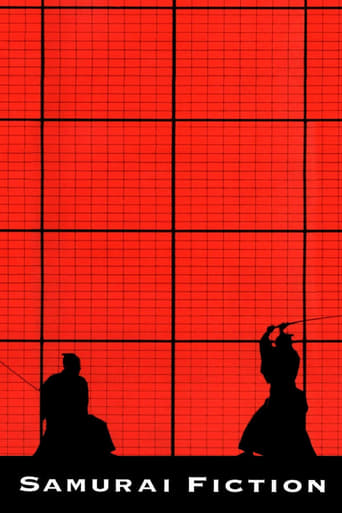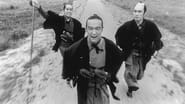hokeybutt
SAMURAI FICTION (4 outta 5 stars) What a terrific movie! It's described as a comedy but, while it does have a lot of humour in it, I think it holds up pretty well with any of the classic samurai stories. The movie is in black and white (with select use of colored images throughout) and I found the visual style very reminiscent of early Kurosawa. In fact, if I had been told that this was an early Kurosawa movie I would have believed it completely. Except for the soundtrack, that is! As old fashioned as the look of the movie is, it has a very modern rock soundtrack by the great Tomayasu Hotei (you know his music from "Kill Bill"). Tomayasu even co-stars in the movie.. playing Kazamatsuri, the badass samurai who steals a clan's revered ceremonial sword and triggers some strong (violent) emotions. After nearly killing a trio of young men bent on recovering the sword, Kazamatsuri becomes obsessed with fighting a peace-loving samurai master who has given up the idea of violence and killing. But maybe he will change his tune if his daughter is threatened...? Great plot, great performances... the actual swordplay may seem a little less flashy than most modern epics but its still exciting stuff, especially when backed by Tomayasu's stirring rock score! The soundtrack might be the one thing that puts people off this movie... personally I didn't find it distracting or "wrong" at all. The old-style movie directing and the "MTV Music" style melded perfectly.
Akira-36
If only every samurai flick from Japan is this cool, then I'd be a very happy man. But then again here lies the greatness of Samurai Fiction. It does not conform to the common rules of period film making. In fact, director Hiroyuki Nakano creates a genuinely fresh look at that age-old jidaigeki genre, by doing everything in the opposite direction. His sense of humour is slick, his presentation stylish and by the end of the movie you can not avoid being moved by the heart of the story. It's actually cathartic for me, a fan of samurai films and Japanese drama/comedy.
Don't be misled by the trailer though, Nakano takes on the film is far from creating a parody of the likes of Kurosawa. SF is essentially a fresh comedy which happens to be set in the Edo period, because it works so well in conveying his message to the audience.The casting is pitch-perfect, characterization is sublime, editing is effective and smartly executed, while the direction is top-notch and funky. You would also love the art direction, cinematography and best of all the soundtrack of the film. The music pieces themselves are melody narrator of the story, as they carry you throughout the journey and mark transitions of the scenes so effectively.I must say Samurai Fiction will be half as good without the music, so a special praise should go the the talented Tomoyasu Hotei, who himself turned in such a cool performance as the ronin Kazamatsuri. He's probably the most suave renegade on film after the great Toshiro Mifune.
The film directly opens with a promise of a sequel by directly entitling the movie Episode One: Samurai Fiction. Then we jump backward all the way to the year 1696, the Edo Period. The narrator then states that the character you see on the screen was the narrator himself, 300 years ago. The film then closes with the same narrator saying that it would take him a long time to learn the lesson of love. Enter the sequel: Episode 2002: Stereo Future. Can't wait to watch it!!!
lordameth
I think Samurai Fiction is a truly amazing film for the way it balances artsiness with more typical film styles, for the unusual combination of traditional samurai tales with modern rock-ish music. I can't quite tell if it is meant to be an homage to Kurosawa and the like or not, but it's certainly serious enough, and good enough, to not be a parody.Normally, I don't like black and white films, but the very limited and carefully placed use of color helps this film immensely.I saw it first with no subtitles, and was quite understandably & totally lost. But now that I have seen it again, I'm glad I bought the DVD. Now, if I can only find the soundtrack...
frankgaipa
Best I can say for this is the two actors (pardon my inability to figure which actor names) who come center stage in the latter half of the film, the samurai who's carrying the stolen sword and the retired swordsman with the daughter, show commanding enough presences that either could command the screen in a real samurai film. They even make Samurai Fiction's protagonist seem a little more interesting by association.The problem with guitar-based rock in films portraying this period is people don't walk, run, fight to a four-beat. I just re-watched Hidden Fortress on the largest screen with the best sound available here. Mostly it's scored with traditional wind, string, and percussion instruments. But in a few, I think unfortunate, instances, Kurosawa gave over to western instruments for the sort of "welling-up" music with which Westerners now attempt to wrench emotions their directorial skills haven't earned. I shudder to think that, besides swiping the plot, Lucas may have let Kurosawa's western interpolations inspire that awful Star Wars music. The soundtrack of Sogo Ishii's Angel Dust showed a film can be scored Japanese style-with modern instruments and techniques, and even interpolate, without being destroyed by, Western sounds. But what Ishii does is a long way from playing electric guitar unkeyed to screen movements. In the same theater as Hidden Fortress, months before I saw Toyoda's Portrait of Hell destroyed, to blindly good reviews, by a live indie band that seldom even glanced at the screen.On the other hand, I mostly liked Ryuhei Kitamura's Versus. Go figure.




